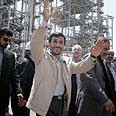
Ahmadinejad says Israel won't survive
Iranian leader announces 'idea of Greater Israel has expired, and idea of Lesser Israel has expired too'; adds Tehran cooperated with IAEA with 'full transparency' and agency's report confirms Islamic republic's 'peaceful drive' for nuclear energy
Iranian President Mahmoud Ahmadinejad said the UN Nuclear watchdog had no legal right to consider material alleging Iran wanted the atom bomb, and that an IAEA report proved Tehran's peaceful intent, Press TV reported on Thursday.
The Iranian leader also denounced Israel and once again refuted the Holocaust. Speaking to reporters on Thursday, he smirked at the notion of a "greater" Israel that would include occupied Palestinian territories.
Ahmadinejad said that while "some say the idea of Greater Israel has expired, I say the idea of a Lesser Israel has expired, too."
He also repeated previous anti-Israel comments, calling the Holocaust by Nazi Germany a "fake" and saying Israel is perpetrating a holocaust on the Palestinian people.
On Monday, the International Atomic Energy Agency said in its report that Iranian stonewalling had brought to a standstill an agency inquiry to resolve whether Tehran had covertly researched ways to make a nuclear bomb.
But Press TV said Ahmadinejad had told it in an interview that the IAEA report had confirmed the peaceful nature of Iran's nuclear program and that Tehran had cooperated with the Vienna-based UN agency with "full transparency".
Iran says its nuclear program is for generating electricity, rejecting Western accusations it is seeking to build weapons.
"President Ahmadinejad said the report confirms Iran's peaceful drive for nuclear energy," Press TV said, adding it would give more details of the interview later. Ahmadinejad is also due to hold a news conference later on Thursday.
"He said the report had no negative points about Iran's nuclear program other than the alleged studies which have no legal basis and are beyond the jurisdiction of the UN Nuclear watchdog," the English-language television station said.
'Israel in a weak position'
The IAEA wants Iran to clarify intelligence material pointing to links between Iranian projects to process uranium, test high explosives and modify the cone of its long-distance Shahab-3 missile in a way suitable for a nuclear warhead.
The Islamic Republic has repeatedly denied the allegations but the IAEA says Iran must substantiate its position by granting access to sites, documents and relevant officials for interviews.
The United States, Britain and France this week vowed to seek harsher sanctions on Tehran over its defiance of UN demands for full disclosure and a suspension of uranium enrichment.
The United States and Israel, Iran's arch foes, have not ruled out military action if diplomacy fails to resolve the row.
Press TV said Ahmadinejad played down the possibility of an Israeli attack against Iran: "Ahmadinejad said Israel is in a weak position to launch attacks against any other country."
The president said Iran had made it clear it would defend its territorial integrity if attacked, Press TV added.
Reuters and The Associated Press contributed to this report










